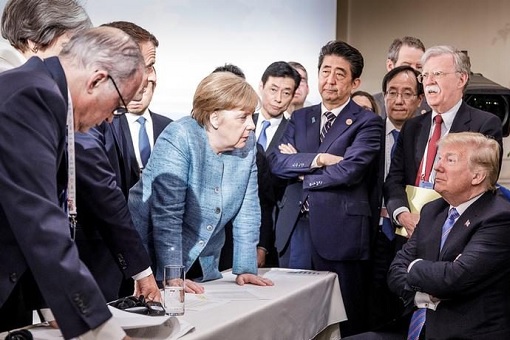Overnight Dow Jones futures indicated that the Dow will open Thursday market down by 377.74 points. That means the stock markets around the world will continue to plunge after the DJIA closed 831.83 lower on Wednesday. That’s the third biggest stock market plunges this year, after February 5 (1,175-point drop) and February 8 (1,033-point drop).
Dropping like rock, the Nasdaq Composite plummeted 4% or 315.97 points. Even the S&P 500 lost 3.29% (94.66 points) and small cap Russell 2000 shed 2.86% (46.45 points). The technology stocks was beaten so terrible that Amazon.com Inc. founder Jeff Bezos lost US$9.1 billion, lowering the billionaire’s net worth to US$145.2 billion – lowest since July.
Oracle of Obama – Warren Buffett – was among the biggest losers when the Wednesday market bloodbath saw his net worth slid US$4.5 billion, while Europe’s wealthiest person, Bernard Arnault, also lost US$4.5 billion as shares of his luxury empire LVMH (Louis Vuitton) fell. Overall, the fortunes of theworld’s 500 wealthiest people were down by a staggering US$99 billion.

The world’s 67 wealthiest tech moguls, including Microsoft’s Bill Gates and Facebook Inc.’s Mark Zuckerberg, had US$32.1 billion wiped out from their pocket. America’s billionaires were the hardest hit – US$54.5 billion evaporated into thin air. And U.S. President Donald Trump feels the heat as the mid-term November election is about to kick in.
But it didn’t take him too long to point his finger at the culprit. Trump has essentially thrown the Federal Reserve under the bus when he said – “Actually, it’s a correction that we’ve been waiting for a long time, but I really disagree with what the Fed is doing. I think the Fed is making a mistake. They are so tight. I think the Fed has gone crazy.”
The Fed has raised interest rates 3 times this year and is expected to hike once more before year-end. Market expectations for a December rate hike were as high as 76.3%. The most recent September rate hike drew criticism from President Trump. However Fed Chair Jerome Powell thinks otherwise, that interest rates have further room to rise.

Trump, who is known to quickly take credits whenever the stock market hits new records, has every reason to worry about Wednesday’s crash. Normally, a stock market sell-off sets off a buying spree in Treasurys, as investors look for security in the more steady government debt market. But that SOP (standard operating procedure) didn’t happen on Wednesday.
Peter Boockvar, chief investment officer at Bleakley Advisory Group, said – “There’s no flight to safety in bonds. That’s a sea change.” Larry McDonald, head of U.S. macro strategies at ACG Analytics, said – “Something occurred in markets today that has been extremely rare this decade.” The unusual trade could be a warning that there will be more stock market selling ahead.
During the past 20 years, whenever the S&P 500 lost more than 2% in a month, Treasurys outperformed. Perhaps the steepness of Wednesday’s stock market sell-off was nothing but an overdue major correction. Some strategists suggest the market is also concerned about trade wars with China and the impact on corporate profits and on the global economy.

However, prominent political analyst Ian Bremmer thinks something much bigger – and deadlier – could be brewing. He believes the world is entering a “geopolitical recession”. Speaking at the ANZ Finance & Treasury Forum in Singapore, Bremmer said – “This geopolitical recession is something really simple – it’s the end of the U.S.-led global order. And we don’t know what is replacing it yet.”
Bremmer has suggested that a new economic downturn would lead to greater fragmentation across the globe. A major reason for the current political disruption is that the “geopolitical order is no longer as aligned with the United States and its allies”, thanks to deterioration in relationships between Americans and Europeans, not to mention the Chinese.
Similarly, the World Bank agrees that the U.S.-China trade tensions are sending shivers down the global financial markets. World Bank Group President Jim Yong Kim said there are risks from trade growth going down and many low income countries becoming more indebted. He said – “We’re worried abouttrade tensions. It’s a troubling picture.”

The International Monetary Fund (IMF) has already warned that “a further escalation of trade tensions, as well as rising geopolitical risks and policy uncertainty in major economies, could lead to a sudden deterioration in risk sentiment.” Now, Steen Jakobsen, chief investment officer of Saxo Bank, has issued a new warning – U.S. markets are “going it alone” and investors are underestimating the risk in the economy.
So far, China has taken the necessary beatings as a result of the trade war with America. The Chinese tumbling stocks were being laughed at just a week ago. Some arrogant U.S. analysts had even proudly declared that U.S. stocks were weathering the escalating trade war far better than China’s. Obviously, they hadn’t expected the Wednesday’s crash.
Trump appears to be trembling, even panicking, at the sight of Wall Street as the mid-term election closes in. Chinese President Xi Jinping, on the other hand, doesn’t face much political pressure from his country’s 1.4-billion population. Why do you think the Chinese attacked American soybeans? Xi doesn’t give a hoot about the poor people in China, let alone American farmers.

China’s stock market plunge will not force President Xi to give up on its trade war with the United States. Perhaps Wednesday crash could be the beginning of U.S. stock market’s turn to get hammered. The rising interest rates probably were just an excuse used by big boys to take money off the table. This could be the beginning of global recession feared as a result of the China-US trade war.
– Finance Twitter




No comments:
Post a Comment
Note: Only a member of this blog may post a comment.